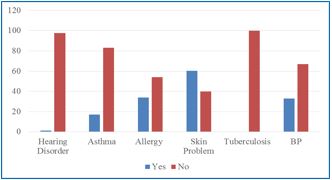Morbidity profile of Street Sweepers and Scavengers of selected municipalities in Malappuram District : A Cross Sectional Study
DOI:
https://doi.org/10.21760/jaims.7.10.18Keywords:
Cross sectional study, Occupational morbidities, street sweepers, scavengers.Abstract
Occupational health deals with all aspects of health and safety in the workplace and has a strong focus on primary prevention of hazards. Street sweeping is a lowly and filthy occupation. In developing countries street sweepers and scavengers play important role in solid waste management system. Street sweepers are unaware of the use of protective devices in most of the areas. Unhygienic environment cause acute health risk of respiratory system and eye, accidents, injuries, cuts and wounds, skin infections, and animal bites. The present study intends to assess the morbidity profile of the sweepers and scavengers of Malappuram district by conducting a survey through personal interview method. The design is descriptive cross sectional study with sample of both genders satisfying the inclusion criteria (selected by stratified random sampling technique). The number of sweepers in each municipality is different so proportion based calculation is used for the detection of sample size. The data collected by telephonic interview method using questionnaire of the study of occupational health analysis of conservancy workers analyzed using the chi square test. Among the participants 78% experienced musculoskeletal symptoms, 60% experienced dermatological symptoms and 41% experienced respiratory symptoms. Less than 5% of the participants experience Cough, Cold, Fever, Chickenpox, Leptospirosis, Typhoid, Pneumonia and Dengue. 31% of the workers had headache.
Downloads
References
Park K. Park text book of preventive and social medicine.24th edition. Jabalpur Barsidas Bhanot publishers;2017:p.840
Kanjanar Pindakham, Wattasit Siriwong. Prevalence rate and risk factors associated with health hazards to select the magnitude of health problems among street sweepers in Chiang Rai province, Thailand. IOSR Journal of Environmental science, Toxicology and food technology. 2015; 9 (7): p.15- 18.
Rajanarayan Tiwari. Occupational health hazards in sewage and sanitary workers. Indian journal of occupational and environmental medicine. 2008;12(3):p.112.
Jayakrishnan T, Jeeja MC, Bhaskar R. Occupational Health problems of municipal solid waste workers in India. Journal of Environmental Health Engineering.2013;2(3):p.42.
Joy Patricia Pushparani, Chitra A, Kalpana J. A cross sectional study to assess the health profile of street sweepers and sanitary workers in a zone of greater Chennai Corporation, Tamil Nadu, India. Indian journal of community medicine and public health 2018;5(10):4357-62
Priyanka V. Patil, RK Kamble. Occupational health hazards in street sweepers of Chandrapur city, central India. International journal of environment 2017;6(2):p.9-18.
Pradeep Salve, Praveen Chokandre. Assessing the exposure of street sweeping and potential risk factors for developing musculoskeletal disorders and related disabilities: a cross-sectional study. BMJ open 2016;6:e012354.
Nagaraj Chitra et al., A study of morbidity and mortality profile of sweepers working under Bangalore city corporation, Indian Journal of occupational and environmental medicine; May 2004: 08(2)
LP de Almeida et al., Seroepidemiologic survey of leptospirosis among environmental sanitation workers in an urban locality in the southern region of Brazil, Rev Saude Publica. 1994 Feb;28(1):76-81.
Cruvinel VRN et al., Vector borne diseases in waste pickers in Brasilia, Brazil. Waste Manag. 2020 Mar 15;105:223-232.
Steven Jerie, Occupational Risks Associated with solid waste Management in the Informal sector of Gweru, Zimbabwe, Journal of Environmental and Public Health, Vol. 2016, Article ID 9024160,14 pages, 2016- https:// doi.org/10.1155/2016/9024160
Veva VK et al, Occupational health hazards of street cleaners- a literature review considering prevention practices at the work place, Int J Occup Med Environ Health 2020;33(6):701-732
Sonal Parikh et al, Study of Non communicable diseases among the street sweepers of Master Station Ahamedabad Municipal Corporation, Indian J community Med .2019 Jul-Sep ; 44(3): 225-227
France Ncube et al, Bioaerosols, Noise and ultraviolet radiation Exposures for Municipal solid waste Handlers, Journal of Environmental and Public Health, vol.2017,2017 (https:// doi.org/10.1155/2017/3081638)
Ewis AA et al, occupational health related morbidities among street sweepers and waste collectors at Beni-suef, Egypt, Egyptian Journal of Occupational Medicine .2013;37(1):79-94
Nayak. S, Shenoi S, Kaur G, Bisen N, Purkayastha A, Chalissery J. Dermatologic evaluation of street sanitation workers. Indian J Dermatol 2013;58:246
Jayakrishnan T, Jeeja MC, Bhaskar R. Occupational Health problems of municipal solid waste workers in India. Journal of Environmental Health Engineering.2013;2(3):p.42.
Reddy EM, Yasobant S. Musculoskeletal disorders among municipal solid waste workers in India: A cross sectional risk assessment. J Family Med Prim Care.2015;4(4):519-524.doi.10.4103/2249-4863.174270
Yang Q. Ying K et al, study on cleaning performance of small road sweeper vehicle, Advances in engineering research, volume 127, 194-198
Bharti et al, High Disease Burden among Sanitation Workers of Shimla Municipality in Himachal Pradesh, India - A Leading Cause of Adult Mortality; IJTDH, 14(3): 1-7, 2016; Article no. IJTDH.23747















